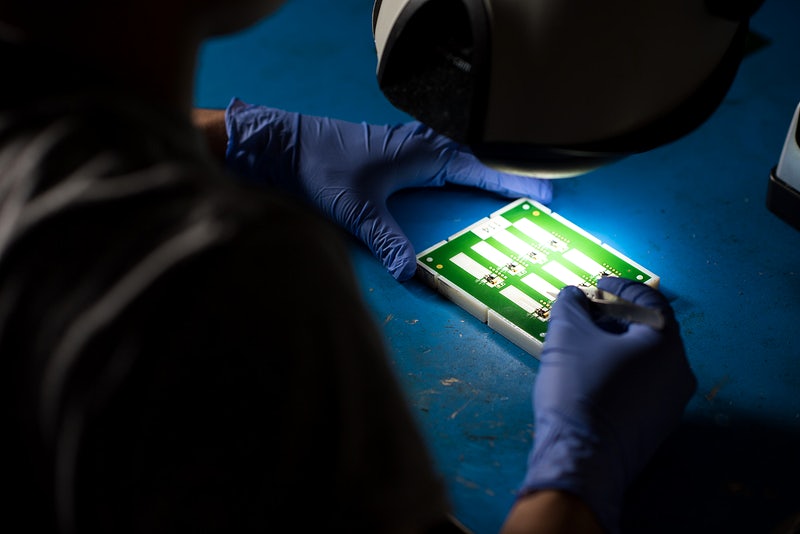Practical Quantum at Work


Quantum applications will show up very soon. Let us take a look at the industries to be directly benefitted by quantum computing, and how
We have been hearing a lot about quantum computing these days. Most discussions veer around the technology that drives this projected super-beast of a computer, and how top companies are trying to solve hardware puzzles including housing the massive machine in a super cool environment. Prototype machines are already functional, and the press is going gaga over how they seem to beat conventional computing hands down, even in a work-in-progress state. Amidst all this clamour, very little is heard on how exactly a quantum machine could benefit businesses once put to actual use.
Quirky technology
While traditional computers handle data in binary bits of zeros and ones, quantum logic surmises a third state of existence that can be in either of these two states. This state of uncertainty, called the Quantum State, enables a quantum bit (qubit) to possess a third value in addition to zero and one. A single qubit can thus represent a combination of several binary bits, allowing processing of more data within the same physical space – and faster too!
Indeed, what sets quantum computers apart is the humongous data processing speed they can attain. Consider this: IBM’scurrent operational quantum computers are of 65 qubits, while those of the closest competitor – Google – are 53 qubits. Yet these machines can perform within a few minutes computations that would take conventional processors 10,000 years to complete! And things won’t stop there because IBM is targeting a 1000 qubits quantum computer by 2023, as well as a 1millionqubits quantum system sometime later.
Exceptional benefits
But what practical advantages are to be derived from that speed? No one is expecting quantum systems to meet personal desktop computing needs. Rather, their real playground would be in research, commercial, and industrial domains. Let us take a look at the industries that would directly benefit from quantum data processing speeds. None of these are distant possibilities, and applications will show up very soon.
- Supply-chains, logistics and transport to benefit from better pattern recognition:The supply chain is the first sector to be strongly impacted by quantum computing. Effectively managing supply networks with minimum disruptions is something where predictive technologies score. Analysing data to discover recurring patterns in them is an excellent tool for predicting tasks that are repetitive. Quantum processing is perfect for this. Prior knowledge of future occurrence of such tasks would benefit both the supply-chains and logistics sectors. Quantum systems are also being used to identify traffic patterns and anticipate optimum routing. Volkswagen is working on such a quantum-based driver notification system. Self-driving carmakers are applying quantum technology for improved battery performance and navigation.
- Weather forecasting to become faster and more precise: Predicting weather conditions has been a lifeline for economies that depend on agriculture. Aviation and tourism are other sectors where weather forecasts play a big role. Directly or indirectly, weather affects nearly 30% of the US GDP. The powers of quantum computing will directly help in preparing weather data models based on much extensive data inputs and infinitely more diverse variable factors – all in a jiffy. More perfect forecasts will result in a worldwide economic impact.
- Aviation scheduling and training to get a boost: The mindboggling capacities of quantum data processing will allow more efficient routing and scheduling management on a far greater scale – directly benefitting the passengers. They will also enable massively more sophisticated computer simulations, which are essential for flight trainings. Airbus and Lockheed Martin are actively exploring the quantum possibilities.
- Services and utilities to be managed more efficiently: Services and utility industries like electricity, gas, water, petroleum relies on a grid-based management system. This involves prospecting, infrastructure set-up, supply, distribution, load pattern tracking, leakage detection, consumer tracking and handling, and worker analytics. Naturally, faster and more scalable computing would mean enhanced performance in each of these areas – ultimately creating a huge boost to public services.
- All security systems to be way more robust: While advanced cryptography where encryptions involve massive prime number factoring of over 300 integers is impenetrable for traditional machines, Quantum systems could decrypt them at ease. This is a potential risk – but on the other hand this will allow quantum devices to push optimizations, random checks, and machine learning to new heights. The resultant security encryption would be way more safe than conventional systems could ever dream of.
- Astronomy and space research analytics to gain greater insights: Greater and faster computing capabilities mean the capacity to solve immensely complex problems within acceptable time limits. Astronomy and space research are two related areas for which colossal data-crunching is a routine ask. Given the cosmic range of their datasets, traditional computers can never match up. NASA is already working towards leveraging quantum computing for data analytics and space missions.
- Healthcare and Pharma Research to pick up speed: Quantum computing is based on non-binary principles, which means it can better represent a biological entity than traditional binary processing systems. This is perfect for creating customised healthcare support – considering variations in body types, genomes, age groups, ethnicity, and geographies. This would have huge ramifications in drug development, diagnostic tools, social security and insurance policies. For pharma research, speeding up a drug-trial model manifold through refined predictive modelling would be a boon both in terms of time and money. And humanity will benefit immensely.
